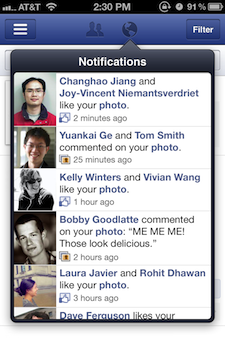Facebook, the popular social networking site, has raised $500 million from Goldman Sachs and a Russian investor in a deal that values the company at $50 billion, according to people involved in the transaction.
The deal makes Facebook now worth more than companies like eBay, Yahoo and Time Warner.
The stake by Goldman Sachs, considered one of Wall Street’s savviest investors, signals the increasing might of Facebook, which has already been bearing down on giants like Google.
The new money will give Facebook more firepower to steal away valuable employees, develop new products and possibly pursue acquisitions — all without being a publicly traded company. The investment may also allow earlier shareholders, including Facebook employees, to cash out at least some of their stakes.
The new investment comes as the Securities and Exchange Commission has begun an inquiry into the increasingly hot private market for shares in Internet companies, including Facebook, Twitter, the gaming site Zynga and LinkedIn, an online professional networking site. Some experts suggest the inquiry is focused on whether certain companies are improperly using the private market to get around public disclosure requirements.
The deal could add pressure on Facebook to go public even as its executives have resisted. The popularity of shares of Microsoft and Google in the private market ultimately pressured them to pursue initial public offerings.
So far, Facebook’s chief executive, Mark Zuckerberg, has brushed aside the possibility of an initial public offering or a sale of the company. At an industry conference in November, he said on the topic, “Don’t hold your breath.” However, people involved in the fund-raising effort suggest that Facebook’s board has indicated an intention to consider a public offering in 2012.
There has been an explosion in user interest in social media sites. The social buying site Groupon, which recently rejected a $6 billion takeover bid from Google, is in the process of raising as much as $950 million from major institutional investors, at a valuation near $5 billion, according to people briefed on the matter who were not authorized to speak publicly.
“When you think back to the early days of Google, they were kind of ignored by Wall Street investors, until it was time to go public,” said Chris Sacca, an angel investor in Silicon Valley who is a former Google employee and an investor in Twitter. “This time, the Street is smartening up. They realize there are true growth businesses out here. Facebook has become a real business, and investors are coming out here and saying, ‘We want a piece of it.’ ”
The Facebook investment deal is likely to stir up a debate about what the company would be worth in the public market. Though it does not disclose its financial performance, analysts estimate the company is profitable and could bring in as much as $2 billion in revenue annually.
Under the terms of the deal, Goldman has invested $450 million, and Digital Sky Technologies, a Russian investment firm that has already sunk about half a billion dollars into Facebook, invested $50 million, people involved in the talks said.
Goldman has the right to sell part of its stake, up to $75 million, to the Russian firm, these people said. For Digital Sky Technologies, the deal means its original investment in Facebook, at a valuation of $10 billion, has gone up fivefold.
Representatives for Facebook, Goldman and Digital Sky Technologies all declined to comment.
Goldman’s involvement means it may be in a strong position to take Facebook public when it decides to do so in what is likely to be a lucrative and prominent deal.
As part of the deal, Goldman is expected to raise as much as $1.5 billion from investors for Facebook at the $50 billion valuation, people involved in the discussions said, speaking on the condition of anonymity because the transaction was not supposed to be made public until the fund-raising had been completed.
In a rare move, Goldman is planning to create a “special purpose vehicle” to allow its high-net-worth clients to invest in Facebook, these people said. While the S.E.C. requires companies with more than 499 investors to disclose their financial results to the public, Goldman’s proposed special purpose vehicle may be able get around such a rule because it would be managed by Goldman and considered just one investor, even though it could conceivably be pooling investments from thousands of clients.
It is unclear whether the S.E.C. will look favorably upon the arrangement.
Already, a thriving secondary market exists for shares of Facebook and other private Internet companies. In November, $40 million worth of Facebook shares changed hands in an auction on a private exchange called SecondMarket. According to SharesPost, Facebook’s value has roughly tripled over the last year, to $42.4 billion. Some investors appear to have bought Facebook shares at a price that implies a valuation of $56 billion. But the credibility of one of Wall Street’s largest names, Goldman, may help justify the company’s worth.
Facebook also surpassed Google as the most visited Web site in 2010, according to the Internet tracking firm Experian Hitwise.
Facebook received 8.9 percent of all Web visits in the United States between January and November 2010. Google’s main site was second with 7.2 percent, followed by Yahoo Mail service, Yahoo’s Web portal and YouTube, part of Google.
For Mr. Zuckerberg, the deal may double his personal fortune, which Forbes estimated at $6.9 billion when Facebook was valued at $23 billion. That would put him in a league with the founders of Google, Larry Page and Sergey Brin, who are reportedly worth $15 billion apiece.
Even as Goldman takes a stake in Facebook, its employees may struggle to view what they invested in. Like those at most major Wall Street firms, Goldman’s computers automatically block access to social networking sites, including Facebook.
 Fast Company
have released their rankings of the 100 most creative people in
business for 2013, a list of “the 2013 global leaders in technology,
design, media, music, movies, marketing, television, sports, and more.”
Sitting at number 28 on the list is Thomas Pentz, the DJ, producer, and
Mad Decent founder known as Diplo.
Highlighted for his creativity in heading his own independent record
label, Diplo is acknowledged for the global success of Baauer’s “Harlem Shake” and the antics that made it possible.
Fast Company
have released their rankings of the 100 most creative people in
business for 2013, a list of “the 2013 global leaders in technology,
design, media, music, movies, marketing, television, sports, and more.”
Sitting at number 28 on the list is Thomas Pentz, the DJ, producer, and
Mad Decent founder known as Diplo.
Highlighted for his creativity in heading his own independent record
label, Diplo is acknowledged for the global success of Baauer’s “Harlem Shake” and the antics that made it possible.















